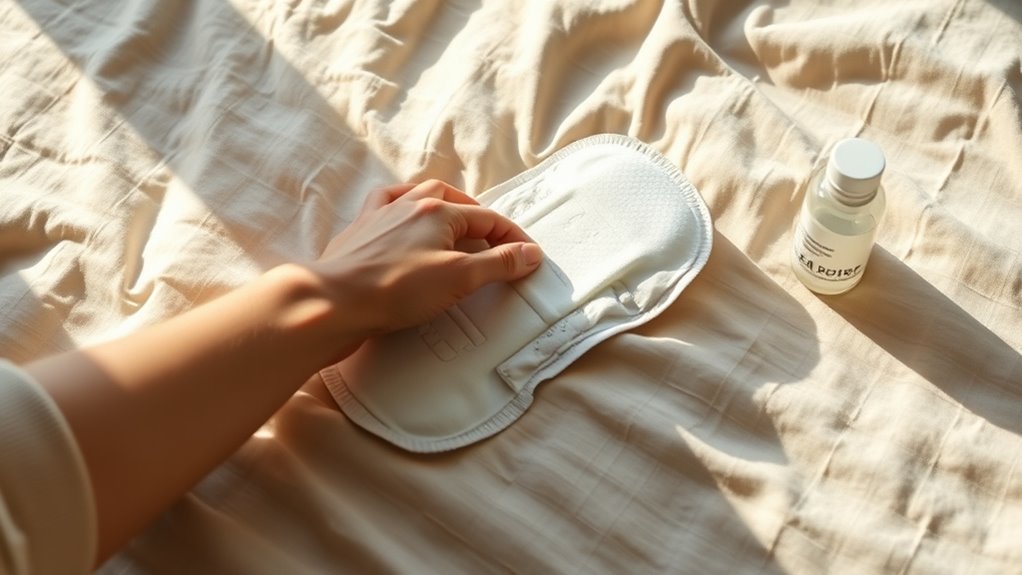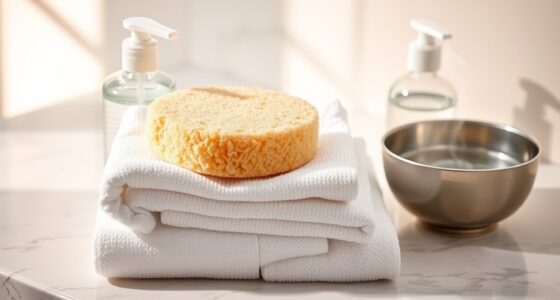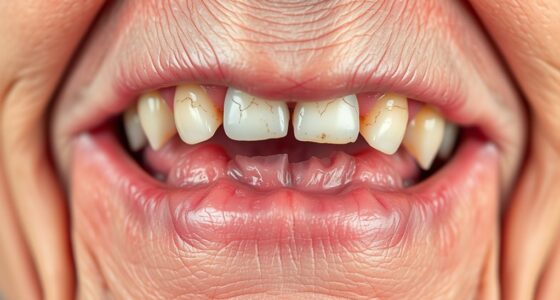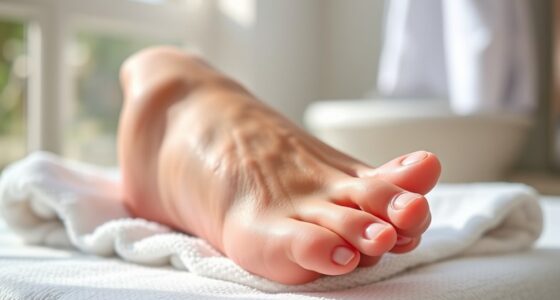To manage incontinence with proper hygiene, make certain you change protective garments promptly to prevent irritation and infections, and clean the skin gently with recommended products. Maintaining good personal hygiene, including regular bathing and patting the area dry, helps prevent odor and discomfort. Incorporate emotional support to boost confidence, and adopt dietary adjustments to reduce bladder irritation. If you’re interested in more tips on staying comfortable and confident, there’s plenty more you can explore.
Key Takeaways
- Maintain regular hygiene by cleaning the skin gently and thoroughly to prevent irritation and infections.
- Use appropriate incontinence products like pads or adult diapers for comfort and odor control.
- Change protective clothing promptly to prevent skin irritation and maintain a clean environment.
- Practice proper skin care with gentle cleansers and moisturizers to protect sensitive areas.
- Ensure good ventilation and dry skin to reduce the risk of rashes and infections.
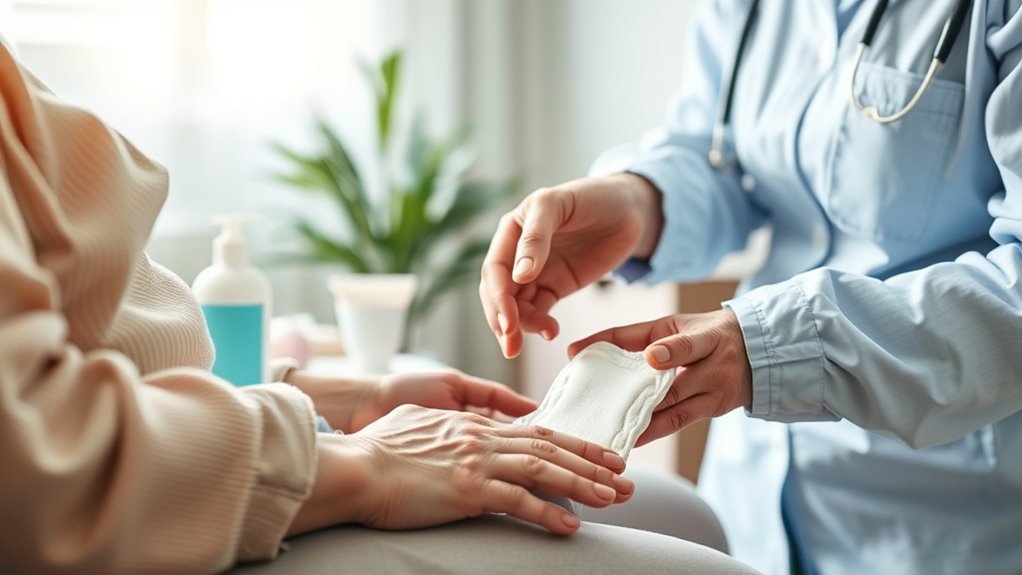
Have you ever wondered how to manage incontinence effectively and comfortably? It’s a common concern, and the good news is that with the right approach, you can maintain your hygiene, comfort, and confidence. One essential aspect often overlooked is the role of emotional support. Dealing with incontinence can feel isolating or embarrassing, but knowing you’re not alone helps tremendously. Connecting with friends, family, or support groups can provide reassurance, practical advice, and emotional comfort. Sharing your experiences can lift your spirits and remind you that many others face similar challenges. This emotional backing encourages a positive mindset, which is indispensable for managing daily routines and maintaining your dignity.
Emotional support is vital for managing incontinence with confidence and dignity.
Another key component is making appropriate dietary adjustments. What you eat directly impacts your bladder health and the frequency of incontinence episodes. You might notice certain foods or drinks trigger leaks or irritate your bladder. Common culprits include caffeine, alcohol, spicy foods, and artificial sweeteners. Cutting back on these can reduce irritation and improve your overall comfort. Incorporate more water-rich fruits and vegetables into your diet, as they help keep you hydrated without overloading your bladder. Also, consider timing your fluid intake—sipping liquids throughout the day rather than drinking large amounts at once can lessen urgency and accidents. Consulting a healthcare professional or nutritionist can help you develop a personalized diet plan that supports your specific needs.
In addition to dietary tweaks, paying attention to emotional health plays a key role in managing incontinence effectively. Stress and anxiety can worsen symptoms, so developing coping strategies such as relaxation techniques, mindfulness, or gentle exercise can make a difference. Maintaining a routine and staying positive can help you feel more in control. Remember, emotional support isn’t just about talking; it’s also about creating an environment where you feel safe and supported, whether that’s through professional counseling or informal conversations with trusted loved ones.
Combining emotional support with dietary adjustments creates a holistic approach to managing incontinence. It’s about addressing both the physical and emotional aspects of your health. By adopting these strategies, you can improve your quality of life, reduce discomfort, and foster a sense of empowerment. Keep in mind that managing incontinence isn’t about perfection but progress. Small, consistent changes can lead to significant improvements, helping you face each day with confidence and resilience.
Frequently Asked Questions
How Can I Prevent Skin Irritation Caused by Incontinence?
To prevent skin irritation from incontinence, you should keep your skin clean and dry, changing protective barriers frequently. Apply a gentle moisturizer to maintain your skin’s hydration, which helps prevent irritation. Pay attention to your skin’s pH balance by using pH-neutral products to keep irritation at bay. Regularly inspecting your skin and using barrier creams when needed also minimizes friction and discomfort, protecting your skin effectively.
Are There Specific Clothing Modifications for Incontinence Management?
Think of your wardrobe as a fortress, protecting your confidence. You can opt for adaptive clothing with easy-to-open features and discreet underwear that offers comfort and concealment. These modifications make managing incontinence seamless, allowing you to focus on your day without worry. Look for elastic waistbands, adjustable fasteners, and breathable fabrics. This way, your clothing becomes a shield, empowering you with dignity and ease in every situation.
What Emergency Supplies Should I Keep at Home for Incontinence?
You should keep a variety of incontinence products like pads, adult diapers, and wipes handy for emergency preparedness. Stock extra supplies such as plastic bags for disposal and a portable change kit. Consider keeping a waterproof mattress protector and a list of nearby pharmacies or stores that carry incontinence supplies. Being prepared guarantees you’re ready for any unexpected situations, maintaining your comfort and hygiene in emergencies.
How Do I Address Odor Control Effectively?
Oh, the delightful dance of odor control! You can tackle it with odor neutralization products and fresh fragrance options—think sprays or sachets. Ventilate your space regularly, and wash soiled items promptly. Using scented wipes or powders keeps things fresh, while air purifiers help banish lingering smells. Embrace these tips and enjoy your odor-free environment—because nothing says confidence like a scentless sanctuary!
Can Diet Impact Incontinence Symptoms?
Yes, your diet can impact incontinence symptoms. Making nutritional adjustments, like reducing bladder irritants such as caffeine, alcohol, and spicy foods, can help. You should also consider food sensitivities that might worsen symptoms. Keeping a food diary can identify triggers. Eating balanced meals with fiber can improve bowel health, which may reduce pressure on your bladder. Always consult a healthcare professional before making significant dietary changes to verify they suit your needs.
Conclusion
Remember, managing incontinence isn’t just about hygiene—it’s about maintaining dignity and confidence. As you care for yourself or loved ones, you’ll find that staying prepared often coincides with moments of reassurance and comfort. When you keep a routine, you’ll notice how smoother your days become, making unexpected spills less stressful. Embrace these small habits; they not only protect your health but also remind you that caring for yourself is a natural part of life’s journey.
